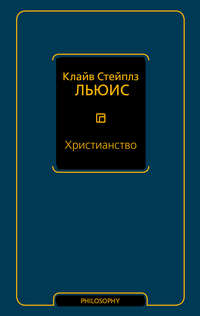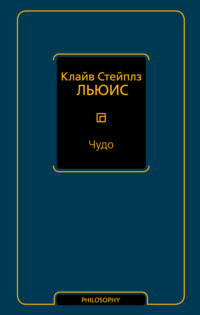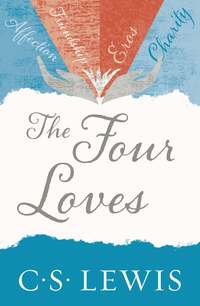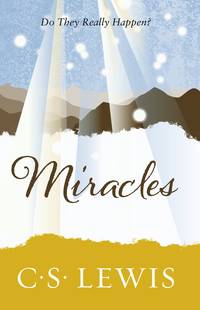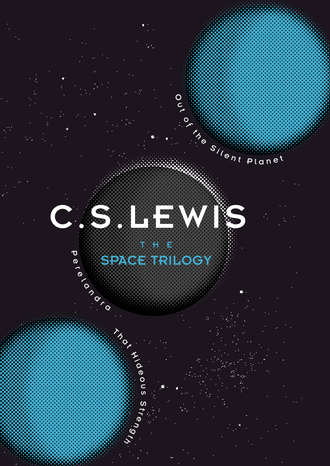
Полная версия
The Space Trilogy
I agree, it is a pity I never saw the pfifltriggi at home. I know nearly enough about them to ‘fake’ a visit to them as an episode in the story, but I don’t think we ought to introduce any mere fiction. ‘True in substance’ sounds all very well on earth, but I can’t imagine myself explaining it to Oyarsa, and I have a shrewd suspicion (see my last letter) that I have not heard the end of him. Anyway, why should our ‘readers’ (you seem to know the devil of a lot about them!), who are so determined to hear nothing about the language, be so anxious to know more of the pfifltriggi? But if you can work it in, there is, of course, no harm in explaining that they are oviparous and matriarchal, and short-lived compared with the other species. It is pretty plain that the great depressions which they inhabit are the old ocean-beds of Malacandra. Hrossa, who had visited them, described themselves as going down into deep forests over sand, ‘the bone-stones [fossils] of ancient wave-borers above them’. No doubt these are the dark patches seen on the Martian disk from Earth. And that reminds me – the ‘maps’ of Mars which I have consulted since I got back are so inconsistent with one another that I have given up the attempt to identify my own handramit. If you want to try your hand, the desideratum is ‘a roughly north-east and south-west “canal” cutting a north and south “canal” not more than twenty miles from the equator’. But astronomers differ very much as to what they can see.
Now as to your most annoying question: ‘Did Augray, in describing the eldila, confuse the ideas of a subtler body and a superior being?’ No. The confusion is entirely your own. He said two things: that the eldila had bodies different from those of planetary animals, and that they were superior in intelligence. Neither he nor anyone else in Malacandra ever confused the one statement with the other or deduced the one from the other. In fact, I have reasons for thinking that there are also irrational animals with the eldil type of body (you remember Chaucer’s ‘airish beasts’?).
I wonder are you wise to say nothing about the problem of eldil speech? I agree that it would spoil the narrative to raise the question during the trial scene at Meldilorn, but surely many readers will have enough sense to ask how the eldila, who obviously don’t breathe, can talk. It is true that we should have to admit we don’t know, but oughtn’t the readers to be told that? I suggested to J. – the only scientist here who is in my confidence – your theory that they might have instruments, or even organs, for manipulating the air around them and thus producing sounds indirectly, but he didn’t seem to think much of it. He thought it probable that they directly manipulated the ears of those they were ‘speaking’ to. That sounds pretty difficult … of course one must remember that we have really no knowledge of the shape or size of an eldil, or even of its relations to space (our space) in general. In fact, one wants to keep on insisting that we really know next to nothing about them. Like you, I can’t help trying to fix their relation to the things that appear in terrestrial tradition – gods, angels, fairies. But we haven’t the data. When I attempted to give Oyarsa some idea of our own Christian angelology, he certainly seemed to regard our ‘angels’ as different in some way from himself. But whether he meant that they were a different species, or only that they were some special military caste (since our poor old earth turns out to be a kind of Ypres Salient in the universe), I don’t know.
Why must you leave out my account of how the shutter jammed just before our landing on Malacandra? Without this, your description of our sufferings from excessive light on the return journey raises the very obvious question, ‘Why didn’t they close their shutters?’ I don’t believe your theory that ‘readers never notice that sort of thing’. I’m sure I should.
There are two scenes that I wish you could have worked into the book; no matter – they are worked into me. One or other of them is always before me when I close my eyes.
In one of them I see the Malacandrian sky at morning; pale blue, so pale that now, when I have grown once more accustomed to terrestrial skies, I think of it as almost white. Against it the nearer tops of the giant weeds – the ‘trees’ as you call them – show black, but far away, across miles of that blinding blue water, the remoter woods are water-colour purple. The shadows all around me on the pale forest floor are like shadows on snow. There are figures walking before me; slender yet gigantic forms, black and sleek as animated tall hats; their huge round heads, poised on their sinuous stalk-like bodies, give them the appearance of black tulips. They go down, singing, to the edge of the lake. The music fills the wood with its vibration, though it is so soft that I can hardly hear it: it is like dim organ music. Some of them embark, but most remain. It is done slowly; this is no ordinary embarkation, but some ceremony. It is, in fact, a hross funeral. Those three with the grey muzzles whom they have helped into the boat are going to Meldilorn to die. For in that world, except for some few whom the hnakra gets, no one dies before his time. All live out the full span allotted to their kind, and a death with them is as predictable as a birth with us. The whole village has known that those three will die this year, this month; it was an easy guess that they would die even this week. And now they are off; to receive the last counsel of Oyarsa, to die, and to be by him ‘unbodied’. The corpses, as corpses, will exist only for a few minutes: there are no coffins in Malacandra, no sextons, churchyards, or undertakers. The valley is solemn at their departure, but I see no signs of passionate grief. They do not doubt their immortality, and friends of the same generation are not torn apart. You leave the world, as you entered it, with the ‘men of your own year’. Death is not preceded by dread nor followed by corruption.
The other scene is a nocturne. I see myself bathing with Hyoi in the warm lake. He laughs at my clumsy swimming; accustomed to a heavier world, I can hardly get enough of me under water to make any headway. And then I see the night sky. The greater part of it is very like ours, though the depths are blacker and the stars brighter; but something that no terrestrial analogy will enable you fully to picture is happening in the west. Imagine the Milky Way magnified – the Milky Way seen through our largest telescope on the clearest night. And then imagine this, not painted across the zenith, but rising like a constellation behind the mountain tops – a dazzling necklace of lights brilliant as planets, slowly heaving itself up till it fills a fifth of the sky and now leaves a belt of blackness between itself and the horizon. It is too bright to look at for long, but it is only a preparation. Something else, is coming. There is a glow like moonrise on the harandra. Ahihra! cries Hyoi, and other baying voices answer him from the darkness all about us. And now the true king of night is up, and now he is threading his way through that strange western galaxy and making its lights dim by comparison with his own. I turn my eyes away, for the little disk is far brighter than the Moon in her greatest splendour. The whole handramit is bathed in colourless light; I could count the stems of the forest on the far side of the lake; I see that my fingernails are broken and dirty. And now I guess what it is that I have seen – Jupiter rising beyond the Asteroids and forty million miles nearer than he has ever been to earthly eyes. But the Malacandrians would say ‘within the Asteroids’, for they have an odd habit, sometimes, of turning the solar system inside out. They call the Asteroids the ‘dancers before the threshold of the Great Worlds’. The Great Worlds are the planets, as we should say, ‘beyond’ or ‘outside’ the Asteroids. Glundandra (Jupiter) is the greatest of these and has some importance in Malacandrian thought which I cannot fathom. He is ‘the centre’, ‘great Meldilorn’, ‘throne’ and ‘feast’. They are, of course, well aware that he is uninhabitable, at least by animals of the planetary type; and they certainly have no pagan idea of giving a local habitation to Maleldil. But somebody or something of great importance is connected with Jupiter; as usual ‘The séroni would know.’ But they never told me. Perhaps the best comment is in the author whom I mentioned to you: ‘For as it was well said of the great Africanus that he was never less alone than when alone, so, in our philosophy, no parts of this universal frame are less to be called solitarie than those which the vulgar esteem most solitarie, since the withdrawing of men and beasts signifieth but the greater frequency of more excellent creatures.’
More of this when you come. I am trying to read every old book on the subject that I can hear of. Now that ‘Weston’ has shut the door, the way to the planets lies through the past; if there is to be any more space-travelling, it will have to be time-travelling as well…!
TO SOME LADIES AT WANTAGE
Preface
This story can be read by itself but is also a sequel to Out of the Silent Planet in which some account was given of Ransom’s adventures on Mars – or, as its inhabitants call it, Malacandra. All the human characters in this book are purely fictitious and none of them is allegorical.
C.S.L.
1
As I left the railway station at Worchester and set out on the three-mile walk to Ransom’s cottage, I reflected that no one on that platform could possibly guess the truth about the man I was going to visit. The flat heath which spread out before me (for the village lies all behind and to the north of the station) looked an ordinary heath. The gloomy five-o’clock sky was such as you might see on any autumn afternoon. The few houses and the clumps of red or yellowish trees were in no way remarkable. Who could imagine that a little farther on in that quiet landscape I should meet and shake by the hand a man who had lived and eaten and drunk in a world forty million miles distant from London, who had seen this Earth from where it looks like a mere point of green fire, and who had spoken face to face with a creature whose life began before our own planet was inhabitable?
For Ransom had met other things in Mars besides the Martians. He had met the creatures called eldila, and specially that great eldil who is the ruler of Mars or, in their speech, the Oyarsa of Malacandra. The eldila are very different from any planetary creatures. Their physical organism, if organism it can be called, is quite unlike either the human or the Martian. They do not eat, breed, breathe, or suffer natural death, and to that extent resemble thinking minerals more than they resemble anything we should recognise as an animal. Though they appear on planets and may even seem to our senses to be sometimes resident in them, the precise spatial location of an eldil at any moment presents great problems. They themselves regard space (or ‘Deep Heaven’) as their true habitat, and the planets are to them not closed worlds but merely moving points – perhaps even interruptions – in what we know as the Solar System and they as the Field of Arbol.
At present I was going to see Ransom in answer to a wire which had said ‘Come down Thursday if possible. Business.’ I guessed what sort of business he meant, and that was why I kept on telling myself that it would be perfectly delightful to spend a night with Ransom and also kept on feeling that I was not enjoying the prospect as much as I ought to. It was the eldila that were my trouble. I could just get used to the fact that Ransom had been to Mars … but to have met an eldil, to have spoken with something whose life appeared to be practically unending … Even the journey to Mars was bad enough. A man who has been in another world does not come back unchanged. One can’t put the difference into words. When the man is a friend it may become painful: the old footing is not easy to recover. But much worse was my growing conviction that, since his return, the eldila were not leaving him alone. Little things in his conversation, little mannerisms, accidental allusions which he made and then drew back with an awkward apology, all suggested that he was keeping strange company; that there were – well, Visitors – at that cottage.
As I plodded along the empty, unfenced road which runs across the middle of Worchester Common I tried to dispel my growing sense of malaise by analysing it. What, after all, was I afraid of? The moment I had put this question I regretted it. I was shocked to find that I had mentally used the word ‘afraid’. Up till then I had tried to pretend that I was feeling only distaste, or embarrassment, or even boredom. But the mere word afraid had let the cat out of the bag. I realised now that my emotion was neither more, nor less, nor other, than Fear. And I realised that I was afraid of two things – afraid that sooner or later I myself might meet an eldil, and afraid that I might get ‘drawn in’. I suppose everyone knows this fear of getting ‘drawn in’ the moment at which a man realises that what had seemed mere speculations are on the point of landing him in the Communist Party or the Christian Church – the sense that a door has just slammed and left him on the inside. The thing was such sheer bad luck. Ransom himself had been taken to Mars (or Malacandra) against his will and almost by accident, and I had become connected with his affair by another accident. Yet here we were both getting more and more involved in what I could only describe as interplanetary politics. As to my intense wish never to come into contact with the eldila myself; I am not sure whether I can make you understand it. It was something more than a prudent desire to avoid creatures alien in kind, very powerful, and very intelligent. The truth was that all I heard about them served to connect two things which one’s mind tends to keep separate, and that connecting gave one a sort of shock. We tend to think about nonhuman intelligences in two distinct categories which we label ‘scientific’ and ‘supernatural’ respectively. We think, in one mood, of Mr Wells’ Martians (very unlike the real Malacandrians, by the bye), or his Selenites. In quite a different mood we let our minds loose on the possibility of angels, ghosts, fairies, and the like. But the very moment we are compelled to recognise a creature in either class as real the distinction begins to get blurred: and when it is a creature like an eldil the distinction vanishes altogether. These things were not animals – to that extent one had to classify them with the second group; but they had some kind of material vehicle whose presence could (in principle) be scientifically verified. To that extent they belonged to the first group. The distinction between natural and supernatural, in fact, broke down; and when it had done so, one realised how great a comfort it had been – how it had eased the burden of intolerable strangeness which this universe imposes on us by dividing it into two halves and encouraging the mind never to think of both in the same context. What price we may have paid for this comfort in the way of false security and accepted confusion of thought is another matter.
‘This is a long, dreary road,’ I thought to myself. ‘Thank goodness I haven’t anything to carry.’ And then, with a start of realisation I remembered that I ought to be carrying a pack, containing my things for the night. I swore to myself. I must have left the thing in the train. Will you believe me when I say that my immediate impulse was to turn back to the station and ‘do something about it’? Of course there was nothing to be done which could not equally well be done by ringing up from the cottage. That train, with my pack in it, must by this time be miles away.
I realise that now as clearly as you do. But at the moment it seemed perfectly obvious that I must retrace my steps, and I had indeed begun to do so before reason or conscience awoke and set me once more plodding forwards. In doing this I discovered more clearly than before how very little I wanted to do it. It was such hard work that I felt as if I were walking against a headwind; but in fact it was one of those still, dead evenings when no twig stirs, and beginning to be a little foggy.
The farther I went the more impossible I found it to think about anything except these eldila. What, after all, did Ransom really know about them? By his own account the sorts which he had met did not usually visit our own planet – or had only begun to do so since his return from Mars. We had eldila of our own, he said, Tellurian eldila, but they were of a different kind and mostly hostile to man. That, in fact, was why our world was cut off from communication with the other planets. He described us as being in a state of siege, as being, in fact, an enemy-occupied territory, held down by eldila who were at war both with us and with the eldila of ‘Deep Heaven’, or ‘space’. Like the bacteria on the microscopic level, so these co-inhabiting pests on the macroscopic permeate our whole life invisibly and are the real explanation of that fatal bent which is the main lesson of history. If all this were true, then, of course, we should welcome the fact that eldila of a better kind had at last broken the frontier (it is, they say, at the Moon’s orbit) and were beginning to visit us. Always assuming that Ransom’s account was the correct one.
A nasty idea occurred to me. Why should not Ransom be a dupe? If something from outer space were trying to invade our planet, what better smoke-screen could it put up than this very story of Ransom’s? Was there the slightest evidence, after all, for the existence of the supposed maleficent eldila on this earth? How if my friend were the unwitting bridge, the Trojan Horse, whereby some possible invader were effecting its landing on Tellus? And then once more, just as when I had discovered that I had no pack, the impulse to go no farther returned to me. ‘Go back, go back,’ it whispered to me, ‘send him a wire, tell him you were ill, say you’ll come some other time – anything.’ The strength of the feeling astonished me. I stood still for a few moments telling myself not to be a fool, and when I finally resumed my walk I was wondering whether this might be the beginning of a nervous breakdown. No sooner had this idea occurred to me than it also became a new reason for not visiting Ransom. Obviously, I wasn’t fit for any such jumpy ‘business’ as his telegram almost certainly referred to. I wasn’t even fit to spend an ordinary weekend away from home. My only sensible course was to turn back at once and get safe home, before I lost my memory or became hysterical, and to put myself in the hands of a doctor. It was sheer madness to go on.
I was now coming to the end of the heath and going down a small hill, with a copse on my left and some apparently deserted industrial buildings on my right. At the bottom the evening mist was partly thick. ‘They call it a Breakdown at first,’ I thought. Wasn’t there some mental disease in which quite ordinary objects looked to the patient unbelievably ominous? … looked, in fact, just as that abandoned factory looks to me now? Great bulbous shapes of cement, strange brickwork bogeys, glowered at me over dry scrubby grass pock-marked with grey pools and intersected with the remains of a light railway. I was reminded of things which Ransom had seen in that other world: only there, they were people. Long spindle-like giants whom he calls sorns. What made it worse was that he regarded them as good people – very much nicer, in fact, than our own race. He was in league with them! How did I know he was even a dupe? He might be something worse … and again I came to a standstill.
The reader, not knowing Ransom, will not understand how contrary to all reason this idea was. The rational part of my mind, even at that moment, knew perfectly well that even if the whole universe were crazy and hostile, Ransom was sane and wholesome and honest. And this part of my mind in the end sent me forward – but with a reluctance and a difficulty I can hardly put into words. What enabled me to go on was the knowledge (deep down inside me) that I was getting nearer at every stride to the one friend: but I felt that I was getting nearer to the one enemy – the traitor, the sorcerer, the man in league with ‘them’ … walking into the trap with my eyes open, like a fool. ‘They call it a breakdown at first,’ said my mind, ‘and send you to a nursing home; later on they move you to an asylum.’
I was past the dead factory now, down in the fog, where it was very cold. Then came a moment – the first one – of absolute terror and I had to bite my lip to keep myself from screaming. It was only a cat that had run across the road, but I found myself completely unnerved. ‘Soon you will really be screaming,’ said my inner tormentor, ‘running round and round, screaming, and you won’t be able to stop it.’
There was a little empty house by the side of the road, with most of the windows boarded up and one staring like the eye of a dead fish. Please understand that at ordinary times the idea of a ‘haunted house’ means no more to me than it does to you. No more; but also, no less. At that moment it was nothing so definite as the thought of a ghost that came to me. It was just the word ‘haunted’. ‘Haunted’ … ‘haunting’ … what a quality there is in that first syllable! Would not a child who had never heard the word before and did not know its meaning shudder at the mere sound if, as the day was closing in, it heard one of its elders say to another ‘This house is haunted’?
At last I came to the crossroads by the little Wesleyan chapel where I had to turn to the left under the beech trees. I ought to be seeing the lights from Ransom’s windows by now – or was it past blackout time? My watch had stopped, and I didn’t know. It was dark enough but that might be due to the fog and the trees. It wasn’t the dark I was afraid of, you understand. We have all known times when inanimate objects seemed to have almost a facial expression, and it was the expression of this bit of road which I did not like. ‘It’s not true,’ said my mind, ‘that people who are really going mad never think they’re going mad.’ Suppose that real insanity had chosen this place in which to begin? In that case, of course, the black enmity of those dripping trees – their horrible expectancy – would be a hallucination. But that did not make it any better. To think that the spectre you see is an illusion does not rob him of his terrors: it simply adds the further terror of madness itself – and then on top of that the horrible surmise that those whom the rest call mad have, all along, been the only people who see the world as it really is.
This was upon me now. I staggered on into the cold and the darkness, already half convinced that I must be entering what is called Madness. But each moment my opinion about sanity changed. Had it ever been more than a convention – a comfortable set of blinkers, an agreed mode of wishful thinking, which excluded from our view the full strangeness and malevolence of the universe we are compelled to inhabit? The things I had begun to know during the last few months of my acquaintance with Ransom already amounted to more than ‘sanity’ would admit; but I had come much too far to dismiss them as unreal. I doubted his interpretation, or his good faith. I did not doubt the existence of the things he had met in Mars – the pfifltriggi, the hrossa, and the sorns – nor of these interplanetary eldila. I did not even doubt the reality of that mysterious being whom the eldila call Maleldil and to whom they appear to give a total obedience such as no Tellurian dictator can command. I knew what Ransom supposed Maleldil to be.
Surely that was the cottage. It was very well blacked-out. A childish, whining thought arose in my mind: why was he not out at the gate to welcome me? An even more childish thought followed. Perhaps he was in the garden waiting for me, hiding. Perhaps he would jump on me from behind. Perhaps I should see a figure that looked like Ransom standing with its back to me and when I spoke to it, it would turn round and show a face that was not human at all …



